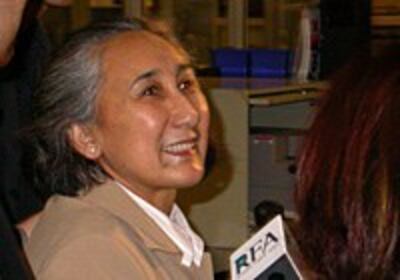
WASHINGTON—Chinese authorities have released two officials working in Uyghur dissident Rebiya Kadeer’s company in Xinjiang after holding them without charge for seven months.
Company secretary Ruzi Mamat and Kadeer’s former assistant Aysham Kerim were freed Dec. 14 and allowed to return home, Kadeer told RFA’s Uyghur service.
Both of them lost weight—they looked like bags of bones...Especially Aysham Kerim. She used to have hair down to her feet, and now she looks like a fleeced sheep.
Both were arrested May 11, and witnesses said at the time that Aysham Kerim, the mother of a seven-month-old infant, was dragged by her hair into a police car.
“Both of them lost weight—they looked like bags of bones,” Kadeer, who was exiled to the United States in March after 5-1/2 years in prison, said in an interview. “Especially Aysham Kerim. She used to have hair down to her feet, and now she looks like a fleeced sheep.”
Surprise raid
Chinese authorities in Urumqi, capital of the Xinjiang Uyghur Autonomous Region in the northwesternmost part of China, gave no explanation for their release. No further details about their detention or release were immediately available.
On May 11, Chinese officials made a surprise raid on Kadeer’s company offices, arresting the two.
Two days later, on May 13, more than 100 police raided the firm, taking 15 large bags full of documents, U.S.-based Human Rights Watch quoted witnesses as saying.
Other sources said they had also opened the company safe and removed 35,000 yuan (about U.S. $6,000) in cash, saying the company was suspected of tax fraud, sources said.
In May, Kadeer’s husband, Virginia-based Sidik Haji Rouzi, described Aysham Kerim and Ruzi Mamat as uninterested in politics.
“These guys are just employees of the company—they’re not involved in politics. They’re just loyal to the company, to Rebiya Kadeer, and to the Uyghur people,” he said.
Threats before exile
In a March 28 interview, Kadeer—one of China’s most famous political prisoners—said Chinese guards had warned her that the five grown children she would leave behind in China would be “finished” if she revealed sensitive information or associated with Uyghur separatists in exile.
Kadeer quoted the guards as using the colloquial Mandarin word wandan, meaning "to finish or put an end to" something.
Kadeer was freed in March before a visit to China by U.S. Secretary of State Condoleezza Rice. She had been in jail since mid-1999 for “illegally providing state intelligence abroad.”
She served five-1/2 years of her eight-year sentence before she was released on medical parole and permitted to join her husband in exile in the United States. Six of her 11 children remain in China.
Many of the Turkic-speaking Uyghurs—who account for most of Xinjiang’s 19 million people—want more autonomy for the northwestern region.
Beijing has waged a continuing campaign against what it calls violent separatist activities in Xinjiang. Uyghurs twice declared a short-lived independent East Turkestan in the 1930s and 40s.
